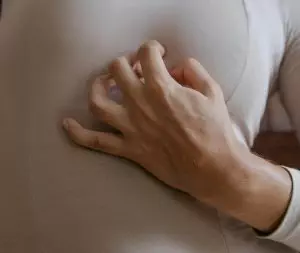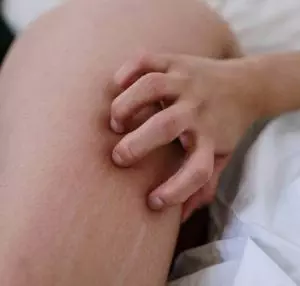By Xiaomei Cai, L.Ac., Ph.D. and Qineng Tan, L.Ac., Ph.D.

Itchy skin, hives all over the body, or skin rashes that itch? Pruritus, commonly known as itching, is an irritating and persistent condition that affects many people. Acupuncture and TCM herbs can offer a holistic approach to alleviate itching.
Pruritus is simply a medical term that means “itching,” or that feeling that you need to scratch your skin. It can refer to itchy skin on one part of the body, or systemic itching that feels like it moves around or affects the whole body. The sensation can be mild, even ticklish, or painful and constant to the point that it is debilitating.
The sensation of itching all over body can significantly impact one’s quality of life, as it can be painful, distracting, and make it difficult to concentrate, relax, or sleep.
Persistent itching requires treatment that takes many possible underlying factors into consideration. This is why acupuncture and TCM can be a good alternative treatment for pruritus.
What Causes Pruritus?
Pruritus can stem from various causes. It can be a primary condition, arising due to a skin problem or skin allergy, such as:
- Atopic dermatitis
- Dermatitis herpetiformis
- Psoriasis
- Eczema
- Hives, urticaria
- Folliculitis
- Dry skin
- Hemorrhoids
- Head lice infestation
Pruritus can also be caused by many other conditions, such as nerve damage, renal disorders that require dialysis, blood diseases like polycythemia vera, hepatitis, liver cirrhosis, infections like chicken pox and shingles, HIV, thyroid disorders, MCAS, pregnancy and perimenopause.
Top 10 Pruritus Causes
Because the sensation of itching, like that of pain, can be influenced by so many factors, there are many possible causes of pruritus. Itchy skin can be caused by a wide variety of conditions, including:
- Allergic Reactions: Common allergens include certain foods, medications, and insect stings or bites. Immune system disorders like MCAS can cause pruritus.
- Dermatitis: Conditions like atopic dermatitis (eczema) and contact dermatitis can lead to persistent itching.
- Skin Infections: Bacterial, viral, and fungal infections can cause itching.
- Dry Skin (Xerosis): Often exacerbated by environmental factors, dry skin can cause itching.
- Internal Diseases: Liver disease, chronic kidney disease, thyroid problems, and certain cancers can cause systemic itching. Chronic kidney disease that require dialysis treatment, in particular, can cause a condition known as Uremic Pruritus.
- Nervous System Disorders: Conditions such as multiple sclerosis, pinched nerves, and postherpetic neuralgia can lead to pruritus. Brachioradial pruritus, for example, is a condition in which irritation of the cervical nerves (C5-C8) causes itching on one or both of the the upper arms.
- Mental Health Issues: Stress, anxiety, and obsessive-compulsive disorder can manifest with itching.
- Pregnancy: Some women experience pruritus during pregnancy due to hormonal changes.
- Perimenopause: Some women experience pruritus during perimenopause and menopause due to a reduction in estrogen levels.
- Reactions to medications: Many drugs can cause pruritus as a side effect, including antibiotics like penicillin, amoxicillin, erythromycin, blood pressure medications, statins, or cholesterol medications, analgesics like aspirin, and tricyclic antidepressants.
Treatment for Pruritus

Conventional medicine typically treats pruritus by trying to find and address the underlying cause, while using medications to alleviate the symptom of itching. This may include topical treatments like over-the-counter or prescription creams and ointments that contain corticosteroids, menthol, or capsaicin to soothe the skin and reduce inflammation. These creams may help relieve localized itching for a time, but they cannot do much to control widespread, systemic itching.
Antihistamines, such as diphenhydramine or cetirizine, may be prescribed to reduce allergic reactions and relieve itching. These can be helpful in some acute cases of pruritus, but again, they do not resolve the problem of chronic itching. Overall, most people with chronic pruritus do not get adequate relief from antihistamine treatment for itching.
For severe itching, oral corticosteroids or immunosuppressants may be prescribed to reduce inflammation and immune response.
TCM and acupuncture can be an effective alternative or adjunct treatment for itching, as TCM addressed both underlying conditions and the symptoms of itchy skin.
Can Acupuncture Help Pruritus?
TCM methods like acupuncture and moxibustion have been used for over 2000 years to help relieve itchy skin conditions and systemic pruritus. Now, scientific research is beginning to show that Chinese medicine is an effective alternative treatment for itching.
The mechanisms that cause the sensation of itching often stem from the brain and the peripheral nervous system. Acupuncture has been shown to have an effect on the nervous system, and specifically, to help reduce the activation of the itch response in the brain.
Itching responses are also activated by the behavior of mast cells, like cytokines. Acupuncture, particularly electroacupuncture, has been shown to help regulate the activity of cytokines, which can help reduce inflammation and sensation.
Acupuncture is well known, now, to help relieve pain by stimulating receptors in the brain. This same action can help to reduce itchy sensations, as well as pain.
The chemical and mechanical activations that cause itching can lead to a chronic problem referred to as the “itch-scratch vicious cycle,” which occurs because of a neural loop in the spinal cord. Acupuncture can potentially help to disrupt this chronic loop of activations that causes the urge to scratch.

Acupuncture and TCM herbal remedies can also help to clear up skin conditions that are directly causing itching, and can help to address deeper underlying conditions, such as liver and kidney ailments, that can be the secondary cause of systemic itching.
Uremic pruritus, which is associated with dialysis treatment for chronic kidney disease or renal failure, affects many people. This type of pruritus can cause sleep problems and affect patients on a daily basis and is believed to be caused by severe dryness of the skin, along with sweating, and chronic inflammation. It may also be related to opioid receptors and inappropriate nerve signaling that triggers the release of cytokines. A review of studies about acupuncture treatment for chronic kidney disease suggests that TCM is highly effective for reducing itching related to uremic pruritus.
One specific study looked at patients undergoing dialysis who were given acupressure treatment. The conclusion was that acupressure was both helpful for relieving itching and cost effective as a treatment alternative.
Acupuncture treatment has an impact not only on the autonomic nervous system, but also on histamine release, and studies have shown that acupuncture is more effective at controlling histamine-related itching than many antihistamine medications.
One study done with 16 patients suffering from brachioradial pruritus (itching on the upper arm/s) found that the majority experienced total resolution of their itching, while the remaining patients experienced partial relief of itching.
Acupuncture Near Me for Pruritus in West Los Angeles
Acupuncture can be beneficial for itchy skin conditions like hives, dermatitis, and rashes. During pregnancy and perimenopause, acupuncture can help balance hormones to relieve itching and insomnia. Acupuncture can also help relieve anxiety, PTSD and panic disorders that can sometimes exacerbate itching sensations. Liver problems, kidney problems, and side effects of cancer treatment can all be addressed with TCM, which may help relieve persistent pruritus.
*This article is for education from the perspective of Traditional Chinese Medicine only. The education provided by this article is not approved by FDA to diagnose, prevent, treat and cure human diseases. It should not stop you from consulting with your physician for your medical conditions. Traditional Chinese Medicine is based on Qi, which is an invisible force that usually cannot be observed by modern science. Because science focuses on testing ideas about the natural world with evidence obtained through observation, these aspects of acupuncture can’t be studied by science. Therefore acupuncture and Chinese herbs are often not supported by double-blind, randomized trials, and they are considered alternative medicine therapies in the United States.
